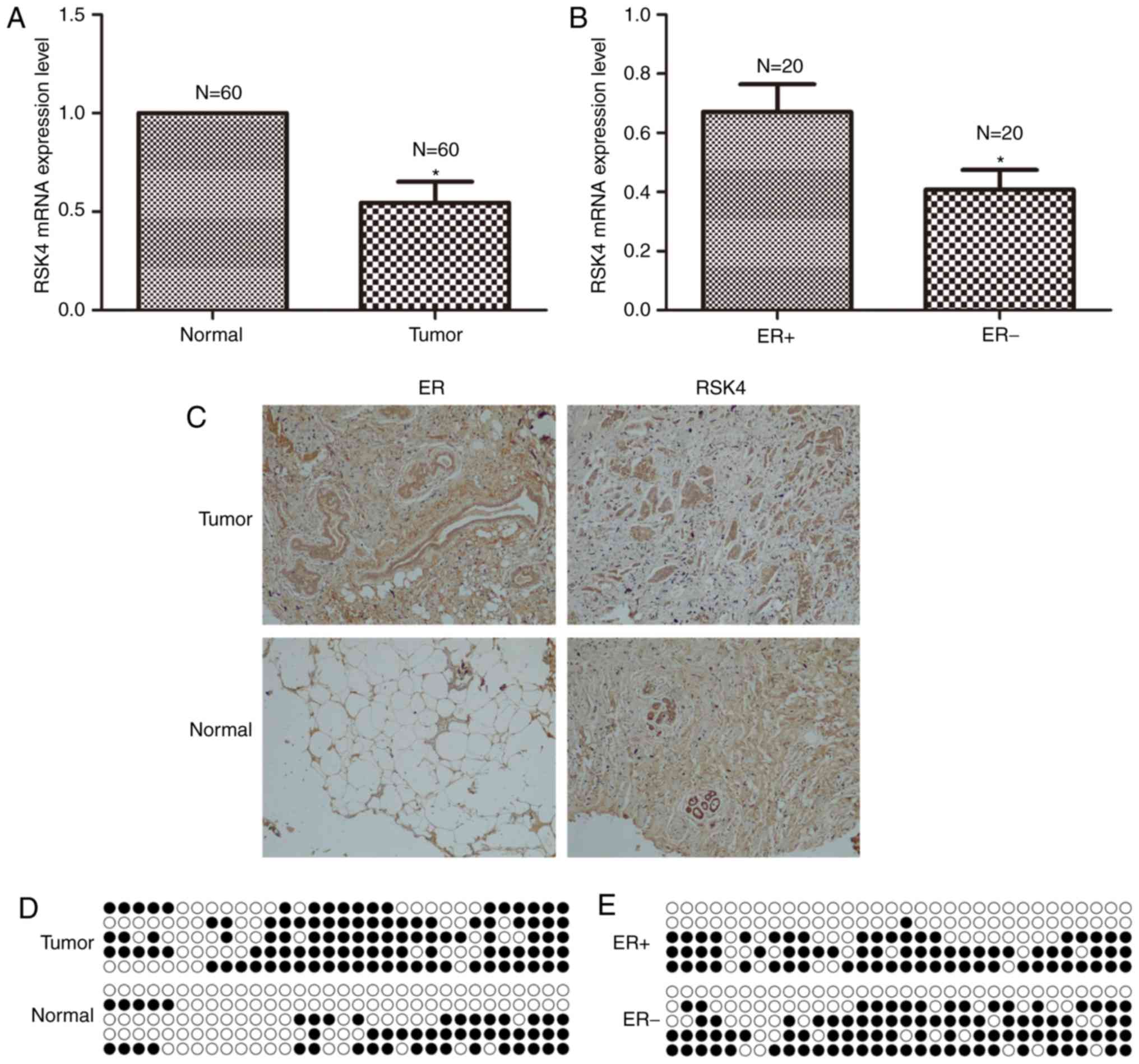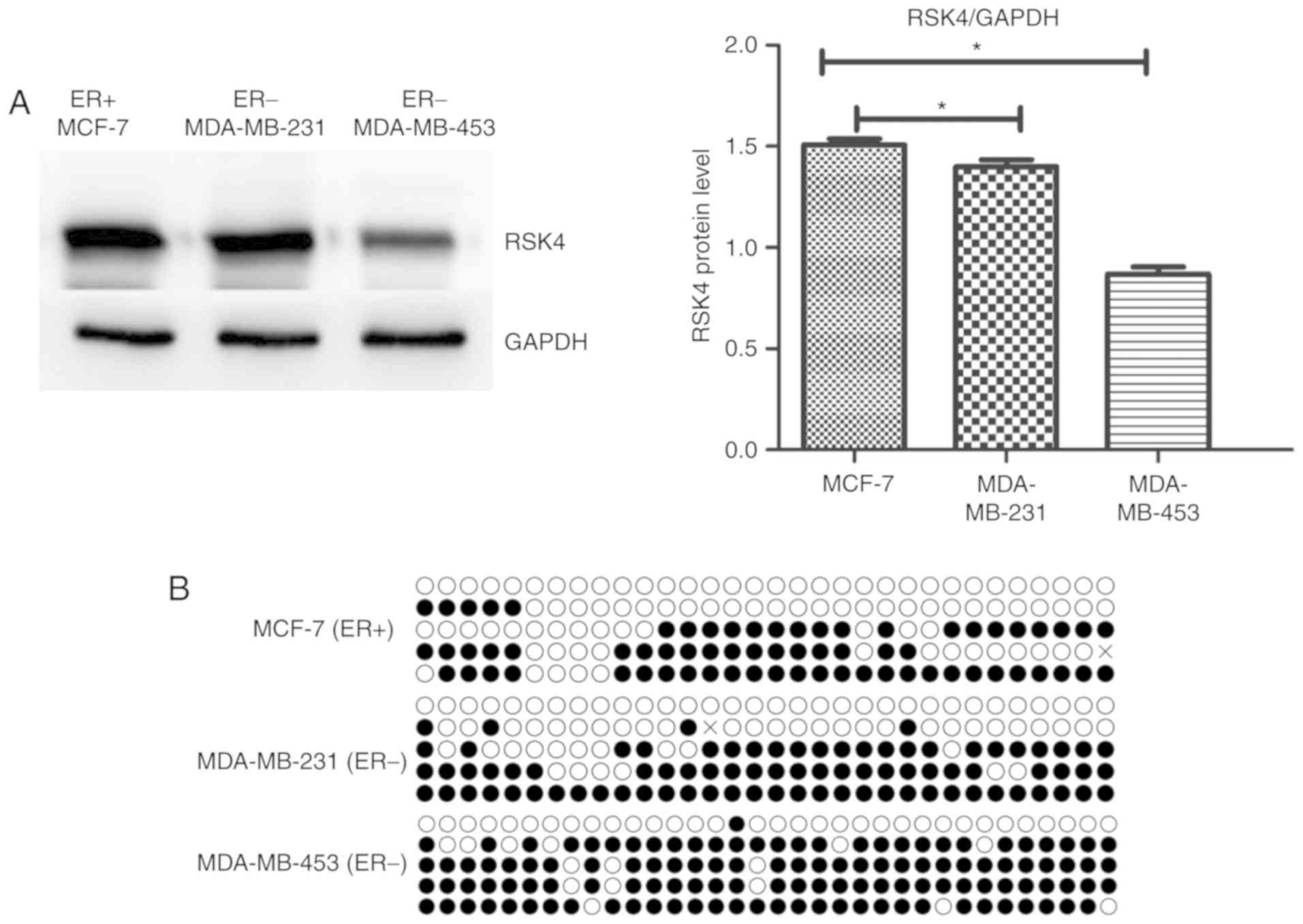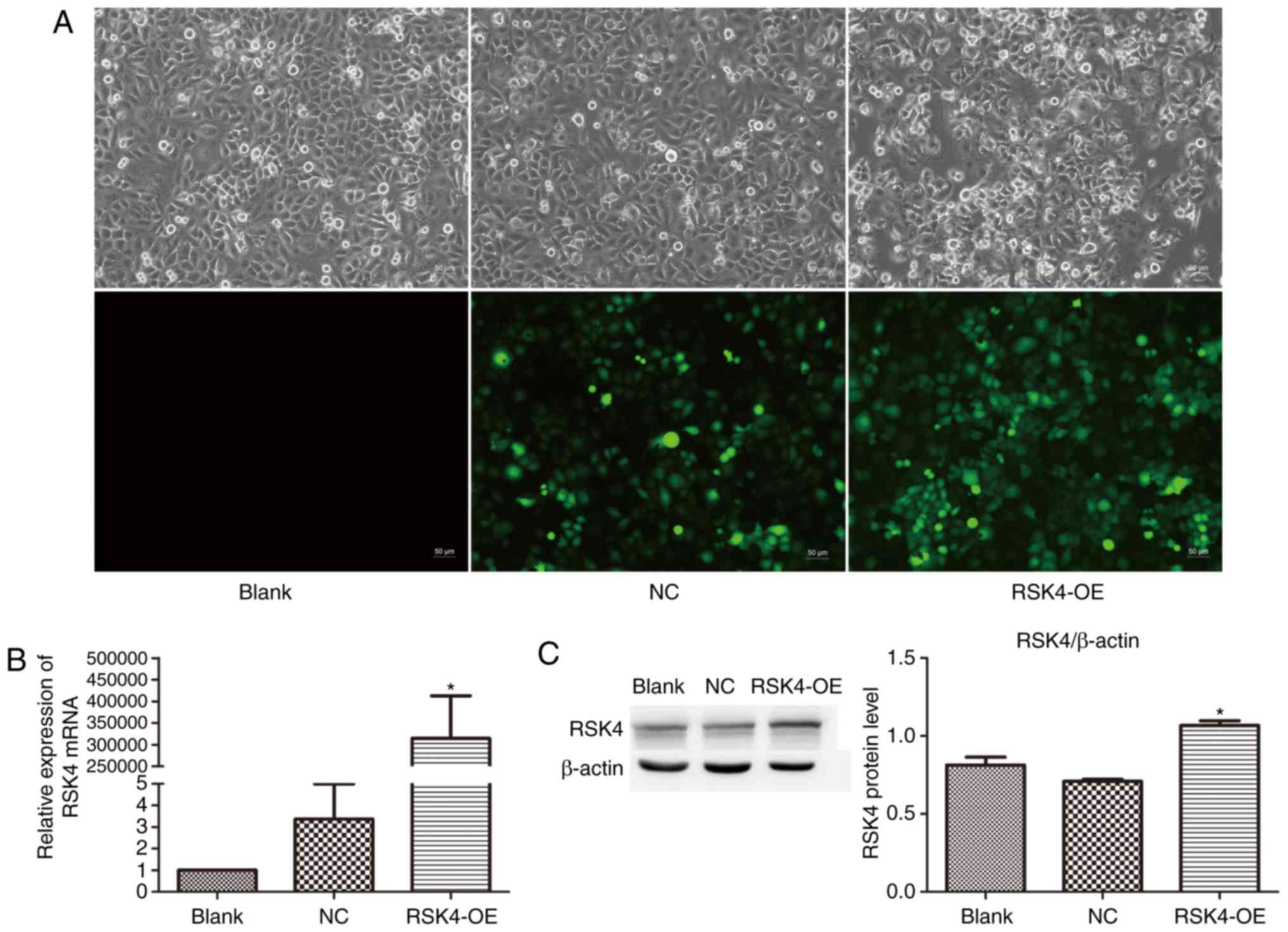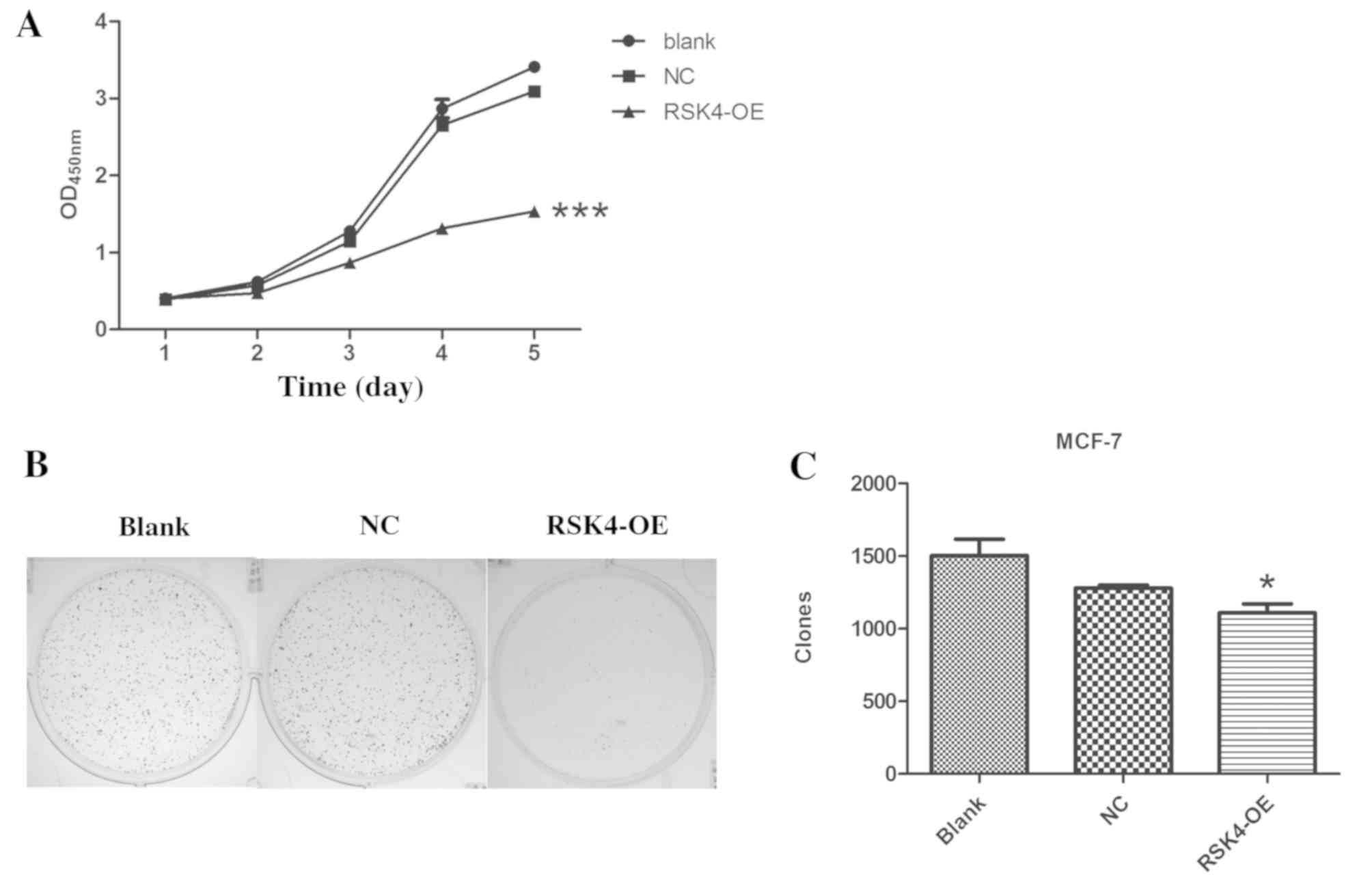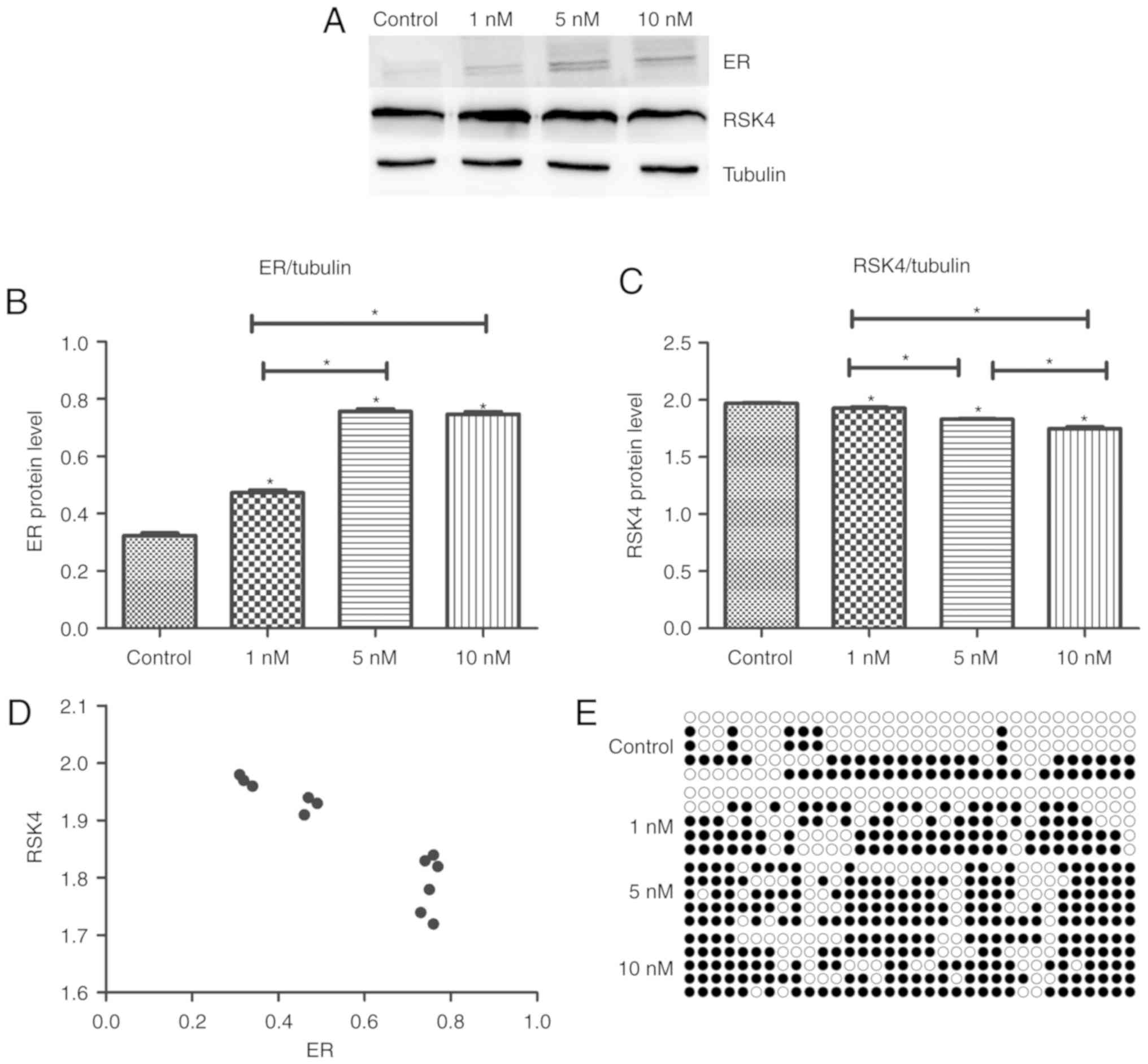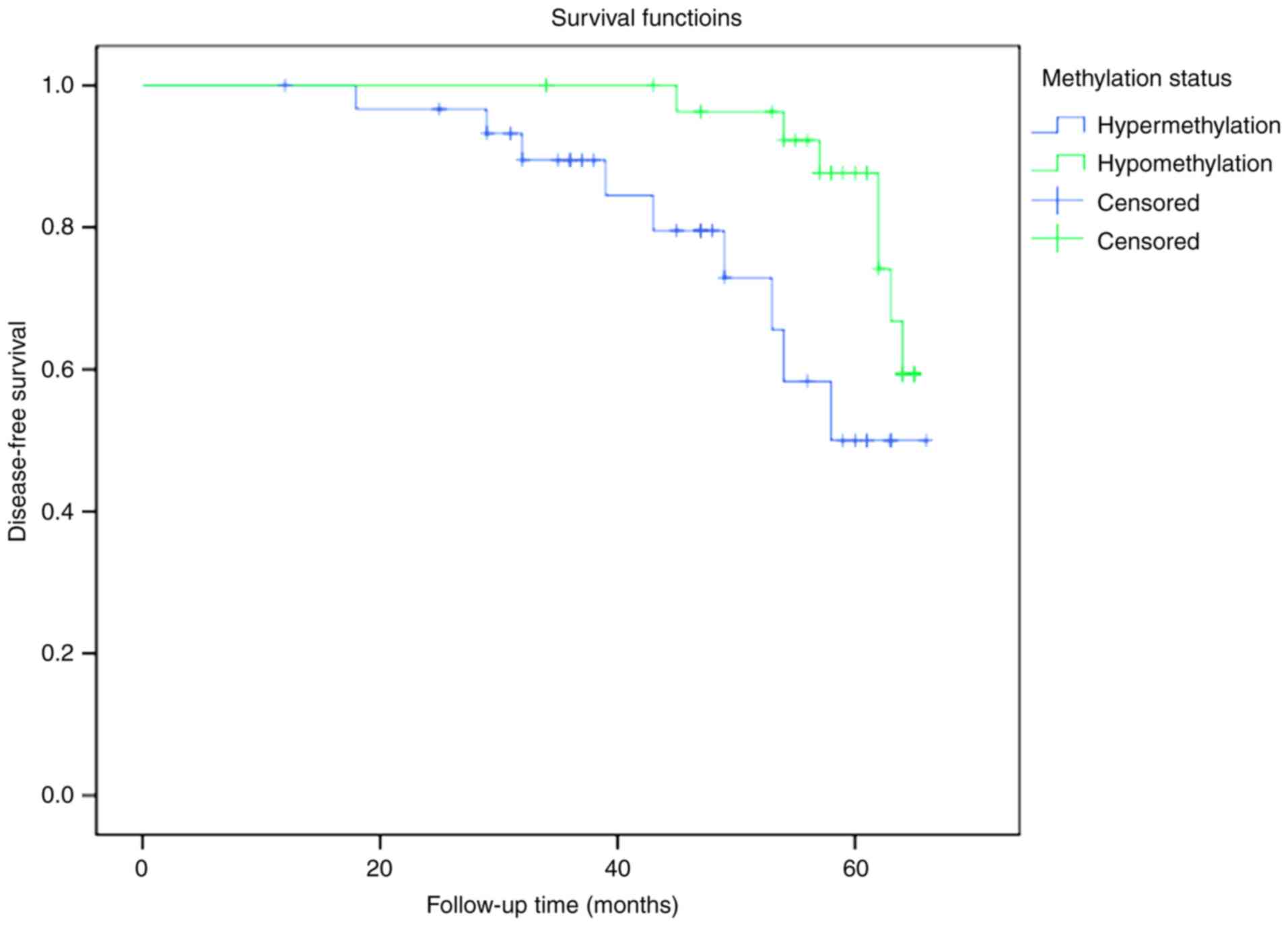|
1
|
Bray F, Ferlay J, Soerjomataram I, Siegel
RL, Torre LA and Jemal A: Global cancer statistics 2018: GLOBOCAN
estimates of incidence and mortality worldwide for 36 cancers in
185 countries. CA Cancer J Clin. 68:394–424. 2018. View Article : Google Scholar : PubMed/NCBI
|
|
2
|
Siegel RL, Miller KD and Jemal A: Cancer
statistics, 2019. CA Cancer J Clin. 69:7–34. 2019. View Article : Google Scholar : PubMed/NCBI
|
|
3
|
Huang X and Yin YM: Updates of Chinese
society of clinical oncology (CSCO) guideline for breast cancer in
2018. Zhonghua yi xue za zhi (In Chinese). 98:1213–1217. 2018.
|
|
4
|
Waks AG and Winer EP: Breast cancer
treatment: A review. JAMA. 321:288–300. 2019. View Article : Google Scholar : PubMed/NCBI
|
|
5
|
Houles T and Roux PP: Defining the role of
the RSK isoforms in cancer. Seminars Cancer Biol. 48:53–61. 2018.
View Article : Google Scholar
|
|
6
|
Yin Z, Fan L, Huang G, Wang H and Wang Z:
The possible role of ribosomal protein S6 kinase 4 in the
senescence of endothelial progenitor cells in diabetes mellitus.
Cardiovasc Diabetol. 11:122012. View Article : Google Scholar : PubMed/NCBI
|
|
7
|
Dummler BA, Hauge C, Silber J, Yntema HG,
Kruse LS, Kofoed B, Hemmings BA, Alessi DR and Frödin M: Functional
characterization of human RSK4, a new 90-kDa ribosomal S6 kinase,
reveals constitutive activation in most cell types. J Biol Chem.
280:13304–13314. 2005. View Article : Google Scholar : PubMed/NCBI
|
|
8
|
Li Q, Jiang Y, Wei W, Ji Y, Gao H and Liu
J: Frequent epigenetic inactivation of RSK4 by promoter methylation
in cancerous and non-cancerous tissues of breast cancer. Med Oncol.
31:7932014. View Article : Google Scholar : PubMed/NCBI
|
|
9
|
Cai J, Ma H, Huang F, Zhu D, Zhao L, Yang
Y, Bi J and Zhang T: Low expression of RSK4 predicts poor prognosis
in patients with colorectal cancer. Int J Clin Exp Pathol.
7:4959–4970. 2014.PubMed/NCBI
|
|
10
|
Rafiee M, Keramati MR, Ayatollahi H,
Sadeghian MH, Barzegar M, Asgharzadeh A and Alinejad M:
Down-regulation of ribosomal S6 kinase RPS6KA6 in acute myeloid
leukemia patients. Cell J. 18:159–164. 2016.PubMed/NCBI
|
|
11
|
Li A, Liu D, Liu Y, Zhou Y, Du Z and Song
J: A pilot study of RSK4 expression in patients with human
non-small cell lung carcinoma. Ann Clin Lab Sci. 48:484–489.
2018.PubMed/NCBI
|
|
12
|
Banno K, Yanokura M, Iida M, Masuda K and
Aoki D: Carcinogenic mechanisms of endometrial cancer: Involvement
of genetics and epigenetics. J Obstet Gynaecol Res. 40:1957–1967.
2014. View Article : Google Scholar : PubMed/NCBI
|
|
13
|
Niskakoski A, Kaur S, Staff S,
Renkonen-Sinisalo L, Lassus H, Jarvinen HJ, Mecklin JP, Bützow R
and Peltomäki P: Epigenetic analysis of sporadic and
Lynch-associated ovarian cancers reveals histology-specific
patterns of DNA methylation. Epigenetics. 9:1577–1587. 2014.
View Article : Google Scholar : PubMed/NCBI
|
|
14
|
Arechavaleta-Velasco F, Zeferino-Toquero
M, Estrada-Moscoso I, Imani-Razavi FS, Olivares A, Perez-Juarez CE
and Diaz-Cueto L: Ribosomal S6 kinase 4 (RSK4) expression in
ovarian tumors and its regulation by antineoplastic drugs in
ovarian cancer cell lines. Med Oncol. 33:112016. View Article : Google Scholar : PubMed/NCBI
|
|
15
|
Jiang Y, Ye X, Ji Y, Zhou X, Yang H, Wei W
and Li Q: Aberrant expression of RSK4 in breast cancer and its role
in the regulation of tumorigenicity. Int J Mol Med. 40:883–890.
2017. View Article : Google Scholar : PubMed/NCBI
|
|
16
|
Zhu J, Li QY, Liu JL, Wei W, Yang HW and
Tang W: RSK4 knockdown promotes proliferation, migration and
metastasis of human breast adenocarcinoma cells. Oncol Rep.
34:3156–3162. 2015. View Article : Google Scholar : PubMed/NCBI
|
|
17
|
Zhu L, Zhang S, Huan X, Mei Y and Yang H:
Down-regulation of TRAF4 targeting RSK4 inhibits proliferation,
invasion and metastasis in breast cancer xenografts. Biochem
Biophys Res Commun. 500:810–816. 2018. View Article : Google Scholar : PubMed/NCBI
|
|
18
|
Harvey JM, Clark GM, Osborne CK and Allred
DC: Estrogen receptor status by immunohistochemistry is superior to
the ligand-binding assay for predicting response to adjuvant
endocrine therapy in breast cancer. J Clin Oncol. 17:1474–1481.
1999. View Article : Google Scholar : PubMed/NCBI
|
|
19
|
Musgrove EA and Sutherland RL: Biological
determinants of endocrine resistance in breast cancer. Nat Rev
Cancer. 9:631–643. 2009. View
Article : Google Scholar : PubMed/NCBI
|
|
20
|
Leary AF, Drury S, Detre S, Pancholi S,
Lykkesfeldt AE, Martin LA, Dowsett M and Johnston SR: Lapatinib
restores hormone sensitivity with differential effects on estrogen
receptor signaling in cell models of human epidermal growth factor
receptor 2-negative breast cancer with acquired endocrine
resistance. Clin Cancer Res. 16:1486–1497. 2010. View Article : Google Scholar : PubMed/NCBI
|
|
21
|
Nguyen PL, Taghian AG, Katz MS, Niemierko
A, Abi Raad RF, Boon WL, Bellon JR, Wong JS, Smith BL and Harris
JR: Breast cancer subtype approximated by estrogen receptor,
progesterone receptor, and HER-2 is associated with local and
distant recurrence after breast-conserving therapy. J Clin Oncol.
26:2373–2378. 2008. View Article : Google Scholar : PubMed/NCBI
|
|
22
|
Srinivasan S, Nwachukwu JC, Bruno NE,
Dharmarajan V, Goswami D, Kastrati I, Novick S, Nowak J, Cavett V,
Zhou HB, et al: Full antagonism of the estrogen receptor without a
prototypical ligand side chain. Nat Chem Biol. 13:111–118. 2017.
View Article : Google Scholar : PubMed/NCBI
|
|
23
|
Livak KJ and Schmittgen TD: Analysis of
relative gene expression data using real-time quantitative PCR and
the 2(-Delta Delta C(T)) method. Methods. 25:402–408. 2001.
View Article : Google Scholar : PubMed/NCBI
|
|
24
|
Jiang G, Dong S, Yu M, Han X, Zheng C, Zhu
X and Tong X: Influence of gap junction intercellular communication
composed of connexin 43 on the antineoplastic effect of adriamycin
in breast cancer cells. Oncol Lett. 13:857–866. 2017. View Article : Google Scholar : PubMed/NCBI
|
|
25
|
Acconcia F, Fiocchetti M and Marino M:
Xenoestrogen regulation of ERalpha/ERbeta balance in
hormone-associated cancers. Mol Cell Endocrinol. 457:3–12. 2017.
View Article : Google Scholar : PubMed/NCBI
|
|
26
|
Tsonis AI, Afratis N, Gialeli C, Ellina
MI, Piperigkou Z, Skandalis SS, Theocharis AD, Tzanakakis GN and
Karamanos NK: Evaluation of the coordinated actions of estrogen
receptors with epidermal growth factor receptor and insulin-like
growth factor receptor in the expression of cell surface heparan
sulfate proteoglycans and cell motility in breast cancer cells.
FEBS J. 280:2248–2259. 2013. View Article : Google Scholar : PubMed/NCBI
|
|
27
|
Hsieh DJ, Kuo WW, Lai YP, Shibu MA, Shen
CY, Pai P, Yeh YL, Lin JY, Viswanadha VP and Huang CY:
17β-estradiol and/or estrogen receptor β attenuate the autophagic
and apoptotic effects induced by prolonged hypoxia through
HIF-1α-mediated BNIP3 and IGFBP-3 signaling blockage. Cell Physiol
Biochem. 36:274–284. 2015. View Article : Google Scholar : PubMed/NCBI
|
|
28
|
Panic A, Stanimirovic J, Obradovic M,
Zafirovic S, Sudar-Milovanovic E, Petrovic N and Isenovic ER:
17β-estradiol inhibits hepatic iNOS via the activation of the
estrogen receptor ERα and inhibition of erk1/2-mir-221 axis. J Biol
Regul Homeost Agents. 32:1369–1377. 2018.PubMed/NCBI
|
|
29
|
Go RE, Hwang KA, Kim CW, Byun YS, Nam KH
and Choi KC: Effect of dioxin and 17β-estradiol on the expression
of cytochrome P450 1A1 gene via an estrogen receptor dependent
pathway in cellular and xenografted models. Environ Toxicol.
32:2225–2233. 2017. View Article : Google Scholar : PubMed/NCBI
|
|
30
|
Lee SH and Nam HS: TNF alpha-induced
down-regulation of estrogen receptor alpha in MCF-7 breast cancer
cells. Mol Cells. 26:285–290. 2008.PubMed/NCBI
|
|
31
|
Boerner JL, Gibson MA, Fox EM, Posner ED,
Parsons SJ, Silva CM and Shupnik MA: Estrogen negatively regulates
epidermal growth factor (EGF)-mediated signal transducer and
activator of transcription 5 signaling in human EGF family
receptor-overexpressing breast cancer cells. Mol Endocrinol.
19:2660–2670. 2005. View Article : Google Scholar : PubMed/NCBI
|
|
32
|
Huang J, Li X, Yi P, Hilf R, Bambara RA
and Muyan M: Targeting estrogen responsive elements (EREs): Design
of potent transactivators for ERE-containing genes. Mol Cell
Endocrinol. 218:65–78. 2004. View Article : Google Scholar : PubMed/NCBI
|
|
33
|
Bartucci M, Morelli C, Mauro L, Ando S and
Surmacz E: Differential insulin-like growth factor I receptor
signaling and function in estrogen receptor (ER)-positive MCF-7 and
ER-negative MDA-MB-231 breast cancer cells. Cancer Res.
61:6747–6754. 2001.PubMed/NCBI
|
|
34
|
Zhou Y, Eppenberger-Castori S, Marx C, Yau
C, Scott GK, Eppenberger U and Benz CC: Activation of nuclear
factor-kappaB (NFkappaB) identifies a high-risk subset of
hormone-dependent breast cancers. Int J Biochem Cell Biol.
37:1130–1144. 2005. View Article : Google Scholar : PubMed/NCBI
|
|
35
|
Singh RR and Kumar R: Steroid hormone
receptor signaling in tumorigenesis. J Cell Biochem. 96:490–505.
2005. View Article : Google Scholar : PubMed/NCBI
|
|
36
|
Song RX, McPherson RA, Adam L, Bao Y,
Shupnik M, Kumar R and Santen RJ: Linkage of rapid estrogen action
to MAPK activation by ERalpha-Shc association and Shc pathway
activation. Mol Endocrinol. 16:116–127. 2002. View Article : Google Scholar : PubMed/NCBI
|
|
37
|
Zhou Y, Yau C, Gray JW, Chew K, Dairkee
SH, Moore DH, Eppenberger U, Eppenberger-Castori S and Benz CC:
Enhanced NF kappa B and AP-1 transcriptional activity associated
with antiestrogen resistant breast cancer. BMC Cancer. 7:592007.
View Article : Google Scholar : PubMed/NCBI
|
|
38
|
Filardo EJ, Quinn JA, Frackelton AR Jr and
Bland KI: Estrogen action via the G protein-coupled receptor,
GPR30: Stimulation of adenylyl cyclase and cAMP-mediated
attenuation of the epidermal growth factor receptor-to-MAPK
signaling axis. Mol Endocrinol. 16:70–84. 2002. View Article : Google Scholar : PubMed/NCBI
|















